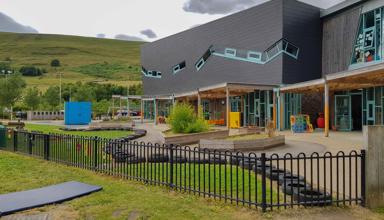Yesterday was GCSE results day. For the first time since 2019, pupils have sat external exams following their cancellation in 2020 and 2021 due to the impact of COVID-19.
As we explained in our A level results article last week, Qualifications Wales, the statutory body that regulates qualifications, announced in March 2021 that learners would once again sit exams in summer 2022. GCSEs, along with A levels and the Skills Challenge Certificate were adapted by WJEC – Wales’ largest exam awarding body – to reduce what was assessed in the exams. This would also allow teachers to focus on the areas most important to a subject.
What are the results for summer 2022?
We explained in our article last week how grades for GCSEs and AS and A levels were awarded in 2020 and 2021. In 2020, these were awarded by a Centre Assessment Grade (based on judgements about learners’ potential) and in 2021, by a Centre Determined Grade model where schools and colleges used a range of evidence from learners’ work to determine a grade. This resulted in significantly higher grades for learners.
This year is a ‘transition year’ (as announced by Qualifications Wales in October 2021) with results reflecting broadly a midway point between 2021 and 2019. Next year, it is likely that there will be a return to results that are more in line with those prior to the pandemic. Our A level article explains more about how exams grades are usually determined.
Percentage of entries achieving GCSE by grade in Wales, 2022 (provisional)
Source: Qualifications Wales
The data in the table above shows results for 2022 based on data published by Qualifications Wales. Data is also published by the Joint Council for Qualifications (JCQ – a membership organisation comprising the eight largest providers of qualifications in the UK). Data are provisional representing the position at the time that results are issued. Data are subject to checking before final data at national (Wales), local authority and school level is published. The data refers to the number of entries into qualifications and includes learners of all ages.
In England, GCSEs are graded from 9 to 1, These grades are not directly comparable to the A*-G grades used in Wales. Some GCSEs designed for use in England may be taken by learners in Wales. Results published by JCQ for all learners include Wales A*-G GCSEs and the 9-1 GCSEs designed for use in England. As the grade scales do not directly align, results are published for key grades A/7, C/4 and G/1.
For the reasons set out above, this year’s results are not directly comparable to 2019, 2020 and 2021.
This year, outcomes for females are higher than males:
- 29.1% of females achieved A* - A compared with 21.0% of males, a difference of 8.1 percentage points;
- 72.1% of females achieved A*-C compared with 65.0% of males, a difference of 7.1 percentage points;
- 97.6% of females achieved A*-G compared with 97.0% of males, a difference of 0.6 percentage points.
What is happening with concerns about exam papers?
During the examination period 2022, there were media reports of issues with exam papers, such as missing parts of exams or unreasonably difficult questions, although these mostly related to A level papers. The Senedd’s Children, Young People and Education Committee has written to Qualifications Wales and WJEC about these concerns. Qualifications Wales has sent an interim reply to the Committee setting out how they and WJEC are responding to the concerns.
The Committee has invited both WJEC and Qualifications Wales to appear before it on 21 September 2022 to give evidence in public about the summer 2022 exams series. If you have any questions you think the Committee should ask, then please send an email to the CYPE inbox or Tweet to @SeneddChildren. All the suggestions received will be forwarded to Committee members for them to draw on in their questioning. While there is no guarantee every question submitted will be asked, this is an excellent opportunity to feed into scrutiny of two key bodies working to oversee and administer the examinations system in Wales.
Article by Sian Hughes, Senedd Research, Welsh Parliament






